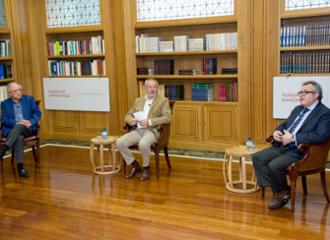- ES
- EN
Events
Start of main content

The World of Magellan and Elcano before and after the First Trip Around the Earth
Humanities Conference Wednesday, 12 February 2020, 19:30 hours Madrid
Organized by:
Fundación Ramón Areces
In cooperation with:
Cátedra Luis de Camoens. Universidad Carlos III de Madrid
Multimedia
Interview with Carlos Álvarez Nogal
Multimedia
Carlos Álvarez Nogal's full lecture
Documents
Audio
- Description
- Programme
The exploration trip set out by Ferdinand Magellan in 1519 and culminated by Juan Sebastián Elcano three years later intended to find a western sea route to reach the Spice islands. After a long and dangerous journey, their travel showed that the Earth could be circumnavigated and that it was much larger than anyone had imagined before. To be aware of the consequences of their discoveries it is necessary to understand the social, political and economic context of this voyage.
At the beginning of the 16th Century, Europe had great challenges to face, but also many conflicts and contradictions to solve. The Renaissance brought a new conception of the role of humanity in the world, which was reinforced by new geographical discoveries. At the same time, that intellectual openness threatened the basic principles on which the feudal society had being built for centuries. Economics also played a crucial role. Since the end of the Middle Ages commercial expansion inside Europe had been decisive to promote and finance geographical explorations such as that of Magellan. Many were attracted by gold and silver, but many others tried to open new trade routes and reach Asian markets sailing West. The new European states competed with each other to achieve that same goal. The Spanish and Portuguese monarchies participated very actively of this discovery fever. As a result, they not only became the gateway to introduce new resources, goods and raw materials in the old continent, but also exported their own language, culture, technology and political institutions to other parts of the world.
Wednesday, 12 February
19:00 h.
Attendees check-in
19:30 h.
Welcome
Raimundo Pérez-Hernández y Torra
Director Fundación Ramón Areces.
Daniel Peña
Director Cátedra Luis de Camoens. Universidad Carlos III de Madrid.
The World of Magellan and Elcano before and after the First Trip Around the Earth
Carlos Álvarez Nogal
Catedrático de Historia Económica en la Universidad Carlos III de Madrid.
Carlos Álvarez Nogal is Professor of Economic History in the Department of Social Science and Researcher in the Figuerola Institute at Universidad Carlos III de Madrid. Ph.D in History from Universidad de Valladolid. Visiting Associate at Caltech (California Institute of Technology) and Visiting Professor at Stanford University (Social Science History Institute and Center for Latin American Studies), Paris School of Economics (EHESS), University of Limerick (Department of History) and Universitá degli Studi di Napoli Federico II (Department of Economics and Statistics).
His research has been financed by the European Commission, Bank of Spain, LAE, Fundación ICO and Fundación Caja Madrid. He was awarded with the Research Prices “Ramón Carande” (1998) and “Felipe Ruiz Martín” (2017) by the Asociación Española de Historia Económica. He has published part of his research in leading international journals like Economic History Review, European Review of Economic History, Revista de Historia Económica/ Journal of Iberian and Latin American Economic History. He also published several books like: Los banqueros de Felipe IV y los metales preciosos americanos, (1621-1665), El crédito de la Monarquía Hispánica durante el reinado de Felipe IV and Oferta y demanda de deuda pública en Castilla (1540-1740).
-
 Activities related
Activities related
-
 News related
News related
-
 Publications related
Publications related
-
4
May
2023
Conference La colaboración entre España y Portugal durante la Unión de las Coronas Madrid, Thursday, 4 May 2023, 19:00 hours
-
9
May
2023
Conference En las trincheras del Imperio: Gálvez, Saavedra, Ezpeleta… Madrid, Tuesday, 9 May 2023, 19:00 hours
-
18
Apr
2024
Conference LOS TROVADORES: una nueva forma de amar Madrid, Jueves, 18 de abril de 2024, 19:00 horas
-

“Las medidas tomadas contra la pandemia han sido las mismas que las de hace siglos”
Published on 06/16/2020



End of main content



